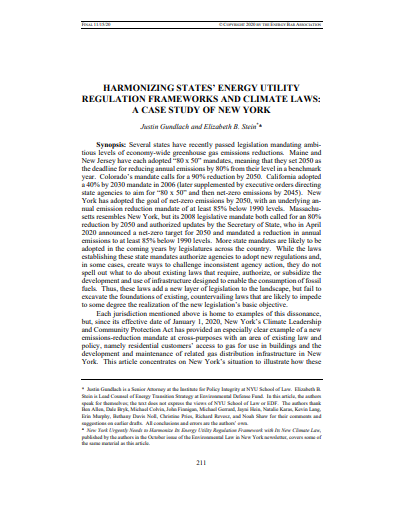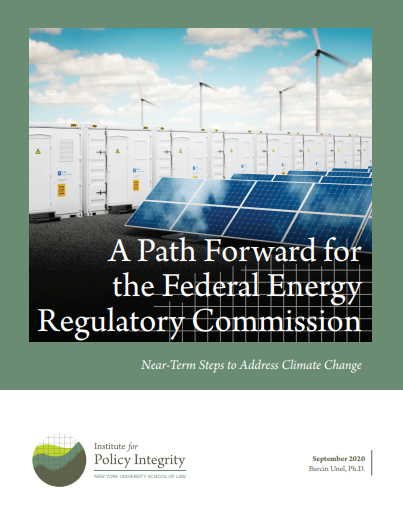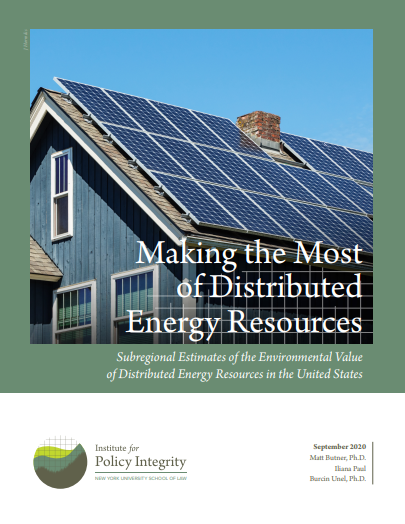-
Comments and Reply Comments on FERC’s Carbon Pricing Policy Statement
The Federal Energy Regulatory Commission proposed a policy statement on carbon pricing in organized wholesale electricity markets. We submitted comments encouraging FERC to strengthen its proposal by making specific clarifications. We later submitted reply comments addressing points made by other commenters and providing further guidance on how FERC can improve its final policy statement.
-
Comments to FERC on Clean Resources’ Participation in NYISO’s Capacity Market
Complainants in an ongoing proceeding ask that the Federal Energy Regulatory Commission (FERC) make changes to the New York Independent System Operator (NYISO)'s capacity market that would impose offer floors on all capacity market bids by state-supported renewables. We submitted comments showing why the complaint's arguments and evidence fall short of the legal standards required for FERC to make the findings and grant the relief requested.
-
Comments to New York DEC on the Value of Carbon
New York State's Department of Environmental Conservation (DEC) has adopted a damage-cost approach to valuing carbon dioxide pollution. We submitted comments on the DEC's draft guidance supporting the policy. Our comments also raise points about the appropriate use of discount rates, calculating damages for other greenhouse gases, inclusion of co-benefits in analysis, and further considerations for a marginal abatement cost approach.
-
Harmonizing States’ Energy Utility Regulation Frameworks and Climate Laws
A Case Study of New York
Unless the institutional framework and laws pertaining to fossil fuels are modified appropriately, decarbonization efforts will likely be stymied by confusion and related opportunities for opposition. This article, published in the Energy Law Journal, aims to start a wider conversation about the process of conforming existing energy law with novel, climate-oriented legislation. We concentrate on New York’s situation to illustrate how these tensions can manifest and what might be done to address them.
-
Presidential Transition Guidance
As the presidential transition begins, the Institute for Policy Integrity has outlined recommended policy priorities for the Biden administration on climate, energy, and environmental policy, and related social equity outcomes. It is crucial that the incoming administration undertake aggressive reforms that are grounded in science and economics. In recent months, we published a series of reports highlighting actionable, near- and medium-term policy recommendations in several key areas.
-
Comments to Arizona on Integrated Resource Planning
The Arizona Corporation Commission regularly requires that load serving entities (LSEs), which supply electricity to ratepayers, file plans with a 15-year time horizon disclosing environmental impacts from different resource mixes and how they will address those impacts. We submitted comments encouraging the Commission to ask that LSEs provide monetized estimates of the damages they expect to result from greenhouse gas emissions using the social cost of carbon.
-
A Path Forward for the Federal Energy Regulatory Commission
Near-Term Steps to Address Climate Change
The Federal Energy Regulatory Commission should take an active role in better aligning regulatory practices with climate policies, speeding up development of necessary transmission infrastructure, and reforming energy market rules. This report details the specific policy reforms that federal policymakers should pursue to take advantage of important opportunities energy markets can provide to combat climate change while ensuring an economically efficient and speedy clean energy transition.
-
Making the Most of Distributed Energy Resources
Subregional Estimates of the Environmental Value of Distributed Energy Resources in the United States
This report provides a new set of hourly E-Values for the whole United States, broken down into 19 subregions, using an open-source reduced-order dispatch model. The patterns uncovered by these estimates can help policymakers design economically efficient DER policies to reduce air pollution from electricity generators.
-
Comments to DOE on Energy Storage Systems
The Department of Energy (DOE) recently requested input on its Energy Storage Grand Challenge, which is a program aimed at expanding the development and proliferation of energy storage systems in the U.S. electric power system. We submitted comments explaining what tools and policies are necessary to ensure that energy storage systems are accurately valued and can participate fully in the market.
-
Comments to the New York PSC on Resource Adequacy
The Brattle Group developed a resource adequacy scenario analysis for the New York Public Service Commission (PSC), which is considering how to best meet its electricity generating capacity and resource adequacy needs. We submitted comments encouraging the PSC to consider several questions that Brattle’s analysis does not examine in depth.
Viewing recent projects in Electricity








